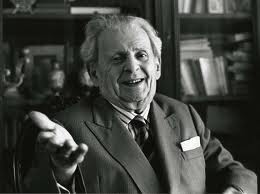
Continuing the Journey with Levinas
As I delve deeper into the philosophy of Emmanuel Levinas, I find that each revisit enriches my understanding and adds new layers of meaning to his concepts. While some aspects of Levinas’s philosophy might seem repetitive in my writings, each discussion is a further step in a profound journey of ethical discovery. This blog post is part of that ongoing exploration, where I aim to blend well-known foundations with new insights gained from my experiences and further study.
For me, Emmanuel Levinas introduces a radical perspective on interpersonal relationships and communication. His philosophy centers on the concept of the ‘Other’—not merely as someone to interact with but as the essential foundation of our ethical obligations. Levinas suggests that true ethics begin with encountering the Other, not as an object in our world but as an infinite source of responsibility and care.
Levinas emphasizes the distinction between “the Saying” and “the Said.” The Saying concerns how we communicate—the openness and willingness to genuinely hear the Other beyond the content of the communication. The Said refers to the content itself. He argues that true communication resides in the Saying, involving a presence that genuinely acknowledges the Other.
In his seminal work, “Otherwise Than Being,” Emmanuel Levinas delves into the intricate relationship between language, ethics, and understanding. His analyses of “the saying” and “the said” provide a profound account of how our ethical relationship with the singular other forms the foundation of all meaning, while simultaneously participating in a universal system of meanings.
Levinas’s exploration challenges us to consider how language functions not just as a tool for communication but as a vehicle of ethical engagement. He responds to the Heideggerian idea that language speaks us, suggesting that while this may hold some truth, it overlooks the essential ethical dimensions of language. For Levinas, the ethical relationship with the other is more fundamental than ontological inquiries into the nature of Being. He argues that meaningful communication presupposes universality—a system of interrelated signs and a positive language.
One of the key meanings of “le dit” (the said) in Levinas’s philosophy is the concept of a “positive language.” This refers to the structured, identifiable language we use in everyday communication—the said in a system. It is a necessary but not the only aspect of language as experientially spoken. This framework allows us to understand “the said” as both the content of our communications (the specific things we identify and articulate) and the broader linguistic system within which our expressions find meaning.
Conversely, “the saying” represents the act of expression itself, particularly in its ethical dimension. It is not merely about transmitting information but about making an ethical appeal to the other. This involves recognizing the other’s uniqueness and responding to them within the context of our shared humanity and linguistic frameworks. By emphasizing “the saying,” Levinas highlights how each linguistic interaction is imbued with ethical significance, transforming ordinary conversations into moments of profound relational significance.
Listening, according to Levinas, is an active, ethical act that requires us to open ourselves to the Other, transcending our egos and preconceptions. It involves listening to understand and acknowledge, not merely to reply or judge, embodying a fundamental human response that facilitates ethical living.
My journey to understand and practice ethical listening has been profoundly shaped by Levinas’s thoughts. In my professional practice, these principles have transformed how I engage with others. By focusing on understanding rather than solving, I foster deeper relationships and enable a genuine exchange of ideas.
“To approach the Other in conversation is to welcome his expression, in which at each instant he overflows the idea a thought would carry away from it. It is therefore to receive from the Other beyond the capacity of the I, which means exactly: to have the idea of infinity. But this also means: to be taught. The relation with the Other, or Conversation, is a non-allergic relation, an ethical relation; but since it is welcomed this conversation is a teaching… it comes from the exterior and brings me more than I contain.”
This quote from Levinas encapsulates the profound ethical commitment involved in truly listening to another person. It highlights how every conversation is an opportunity to learn and be taught, acknowledging the infinite worth and potential of the Other.




